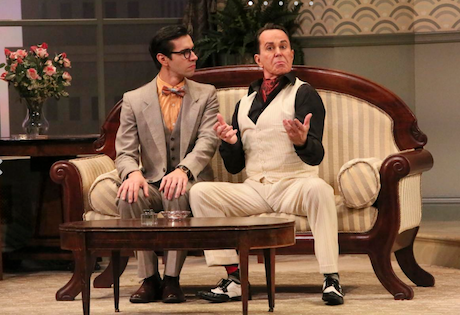'Tenor' belts out huge, pitch-perfect laughs
By ERIC MARCHESE / CONTRIBUTING WRITER, Orange County Register
Great opera singers never age and remain immortal, and the same can be said for “Lend Me a Tenor,” which turned 30 this year but is as fresh as ever.
Directed by Art Manke, La Mirada Theatre and McCoy Rigby Productions’ staging is supremely silly, offering boffo slapstick and pitch-perfect laughs.
A ’30s-style screwball comedy, Ken Ludwig’s uproarious story is fittingly set in 1934. The Cleveland Grand Opera Company is about to host its biggest star ever – Tito Merelli, the world’s greatest opera tenor.
The in-joke is that Tito is played by Davis Gaines, most renowned for his role in a very different operatic story, Andrew Lloyd Webber’s “Phantom of the Opera,” and his presence gives this “Tenor” a huge boost.
On opening night of “Otello,” pompous manager Henry Saunders (J. Paul Boehmer) charges his harried young assistant Max (John Shartzer) with keeping Tito away from what he loves most: wine and women.
Dying to meet Tito are Henry’s daughter (and Max’s girlfriend) Maggie (Kelley Dorney), soprano Diana (Leslie Stevens), guild chair Julia (Colette Kilroy) and an obnoxious nameless Bellhop (Jeff Skowron).
Endless bickering leads Tito’s wife Maria (Catherine LeFrere) to storm out, prompting Tito to take sleeping pills. When Max finds a seemingly dead Tito, Saunders pressures the amateur young singer into replacing Tito on stage.
Later, a revived Tito in his costume, makeup and wig creates the sight of identical-looking Othellos dashing in and out of the suite, sparking big laughs.
Ludwig’s light, deft touch with sparkling dialogue and equally scintillating plotting have always made “Tenor” a winner. Manke and company capitalize on these features, eliciting huge laughs not by forcing the humor but by being true to their roles and to Ludwig’s script. The more misfortune and apparent tragedy that befalls the main characters, the harder we laugh.
In the show’s comedic lead role, Gaines’ non-spoofy reading paints Tito as a cavalier, genuinely genial gent. Earthy and human rather than snobby or conceited, he’s riddled with passion but also exhausted after years of debauchery.
Tito shows true kindness toward, and opens up to, the much younger man, and Gaines and Shartzer’s off-the-cuff singing lesson and brief duet are charming and warmly funny.
Hoping to win over the Tito-smitten Maggie, Max is a classic decent, eager-to-please good guy. With his glasses, bowtie and sweater-vest, Shartzer is suitably nerdy, with moments reminiscent of the slim, rubbery Jerry Lewis in his youth.
Max-as-Tito has Shartzer cannily doing a dead-on copy of Gaines’ Italian-accented Tito, and Shartzer’s rough similarity to a younger Gaines makes Max’s masquerade all the more plausible.
Dorner is fresh and charming, avoiding either a ditsy or dead-serious reading of the ingenue role. Even accounting for a romantic nature, her Maggie is earnest, level-headed and practical.
Boehmer’s weaselly voice and sleazy manner paint Saunders as an oily, hypocritical blowhard ready to exploit Tito’s death to save his own neck and reputation while deftly conveying his sarcasm, scheming nature and desperation.
LeFrere’s fiery Maria lets us see how much her tiffs with Tito feed the couple’s volcanic passions and appetites for drama. Stevens’ ambitious, seductive Diana is convinced sleeping with Tito is her ticket to stardom, Skowron’s Bellhop is hilariously fawning, and Kilroy’s Julia is doddering and veddy British.
Tom Buderwitz’s gorgeous, pastel-colored set gives us a cross-section of the suite’s adjoining rooms, with a soft, rich, inviting décor – a look completed by David Kay Mickelson’s attractive period costumes.
A goofy yet honest-to-goodness sweet quality underlies every well-earned guffaw – one of the main reasons “Tenor” has remained so phenomenally popular as it enters its fourth decade.
Pictured above: John Shartzer (left) and Davis Gaines (right) in La Mirada Theatre for the Performing Arts and McCoy Rigby Productions' staging of “Lend Me a Tenor.” (Photo by Michael Lamont)

